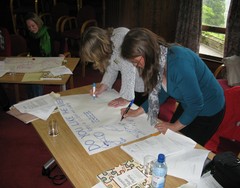John Veverka & Associates
Main menu:
- Home Page
- Our Range of Services
- Interpretive Coaching
- Interpretive Planning
- Interpretive Plan Outline
- Interpretive Training
- John Veverka Resume
- Qualifications
- NEW Advanced Interp. Text Book
- InterpNEWS
- Library
- Expert in Interpretation
- JVA NEWS, Courses and Updates
- Certificates
- Planning/Design of Interpretive Panels
- Interpretive Writing
- Interpretive Writing Course
- Interpretive Trails Course
- Interpretive Panels Course
- Introduction to Heritage Interpretation Course
- Interpretive Planning & Design of Marketing Brochures Course
- Training for Interp. Trainers
- Interpretive Exhibits Course
- Interpretive Master Planning Course
- Interpretive Planning for Scenic Byways.
- Critiquing and Coaching Interpretive Staff
- Advanced Interpretive Planning
- Interpretive Training Center Course Catalogue
- Interp. for International Visitors course.
- Interpretive Exhibits Evaluation
- Interp. Center Feasibility Analysis Course.
- Interp. for Commercial Tour Providers
- Interpretive Researchers Guide for Visitor Studies
- Interp. Planning for Historic Homes
- Heritage Interpretation Training Center
- Interpretive Planning for Botanical Gardens
- An introduction to planning and presenting live interpretive programs and tours for Museum/Heritage Site Docents and Volunteers.
- Developing Marketing Plans for Heritage & Tourism Sites and Attractions
- Interpretation Book Store
- Heritage Interpretation Resource Center
- Interpretive Planning for Historic Farms
- Developing Successful Partnerships
- Developing Interpretive Outreach Programs
- Community Interpretation Planning
- Interpreting Gravestones and Historic Cemeteries
- Using Interpretation to Accomplish Management Objectives.
- An Interpreters Guide for Survival Economics.
- Innovative Strategies for Interpretive Media and Services Planning.
- A Curators Guide for Developing Gallery Tours.
- Advanced Interpretive Writing - Technical Publications
- Advanced Interpretive Services for Managers, Supervisors, Team Leaders and Sr. Staff.
- Advanced Interpretation for Chiefs of Interp. - Interpretive Managers - Regional Interp. Specialists
- Interpreting Critical Issues.
- Developing Commercial Interpretation for Resorts, Cruise Ships, Campgrounds and Tourism Attractions.
- Planning and developing a new commercial tour guiding business.
- Interpretive Evaluation, Visitor Studies and Site Assessment Center
- The Center for Interpretive Planning Advancement & Excellence.
- Developing Requests for Proposals (RFPs)
- Planning and Facilitating Focus Workshops
- InterpNEWS Advertising Details
- Planning for Interpretive Experiences
- 40 Years a Heritage Interpreter
- Interpretive Techniques - The Rest of the Story Course
- Certified Professional Interpretive Planner Certificate
- Certified Professional Interpretive Program
- Certified Professional Interpretive Trainer certificate program.
- Certified Professional Heritage Interpreter certificate program.
- Certified Professional Interpretive Writer certificate program.
- Visitor motives for attending interpretive programs.
- Exhibit Rehab Course
- Developing Training Workbooks & Manuals
- Planning for Railroad Museums and Sites.
- Climate Change Interpretation Course.
- When there's nothing left but the story - interp. storytelling.
- Interpreting Legends Myths and Fables
- InterpSHARE - Seminars 2022
- Interpreting Invasive Species
- Interpretiing Edible Insects
- Interpretaive Planning for Climate Change
- HITC Climate Crisis Resource Center
- PUP Members Only
- Starting a new Interp Consulting Business
- Panels 4 Week Course
- Interpretive Writing - 4 Week Course
- Marketing - 4 Week Course
- Intro to Interpretation - 4 Week Course
- Interp Climate Change - 4 Week Course
- Exhibit Rehab 4-Week Course
- Level 1
- Johns Interpreters Blog
Expert in Interpretation



Expert in Interpretive Planning/Training and Interpretive Consultant - that has a nice ring to it. But what does it really mean? What is the difference between an average run-of-the-mill interpretive planner/consultant or trainer and an "expert" interpretive planner or trainer?
When you surf the web under "interpretive planning" - you will find lots of "experts". So I thought I would chat a bit about what I think the word expert means - particularly in the interpretive profession.
I think that to be an "expert" interpretive planner there are several qualifications or experiences that the planner should possess. Here are my top ten:
1. I think that an expert interpretive planner should have a college degree with a major in interpretation - including a course specifically in "interpretive planning"? Without a sound academic background in interpretive principals, theory, techniques, media, interpretive research, etc. you simply aren't going to know that much about the profession and how to do it. How can you be an expert in something you have little or no academic training in at all?
2. An expert interpretive planner or trainer has heard of Freeman Tilden and has first hand experience in actually applying Tilden's Interpretive Principals to interpretive products, services or programs.! They know and can easily demonstrate the difference between "information" and "interpretation", and can apply interpretive principals to exhibits, live programs, etc. They can "do" interpretation at the drop of a hat!
3. I think that an expert interpretive planner should have lots of experience (years) "doing" interpretive planning, and have a lot of products that demonstrate excellence and innovation in the interpretive process. Each interpretive project is a learning experience with which the planner thinks about improvements to their interpretive planning strategies that can be applied to the next project. Just because you own a company that offers interpretive planning services doesn't mean that you are really good at doing it! That leads us to the next criteria for being an expert -
4. An expert interpretive planner knows that they don't know everything and are open to, and anxious to learn and improve their craft, skills, and philosophical strategies. An expert always wants to improve - to be the best! Being an interpretive planner is NOT just about what you do but more about "Who You Are"! It is not just a job or a project - it is a career philosophy and dedication to that career that seperates experts from those simply "doing a job".
5. An expert interpretive planner is certified as professional interpreter, interpretive planner or trainer. That means that they have taken written exams, submitted samples of completed interpretive plans or materials to a review board that assesses the quality of the products and have demonstrated to other experts that they produce superior quality work. I think that if you produce average quality work - you really aren't an expert.
6. An expert interpretive planner or trainer shares their ideas, knowledge, strategies with others - so they have probably published articles about interpretation in various interpretive journals, presented at conferences or workshops or found other ways to teach and share what they have learned. That leads us to number 7.
7. An expert interpretive planner wants to encourage and help others to "raise the bar" in interpretive planning standards - to help the interpretive profession grow and become better. To help improve the quality of interpretive products, and help train those providing those products. They are very active within their profession and committed to contribute to its growth.
8. An expert in interpretation/interpretive planning is a member of the various professional interpretive organizations, such as the National Association for Interpretation, Interpretation Canada, and others. It is through these professional memberships - reading professional journals - attending National and International interpretive conferences - sharing ideas and learning new ones - keeping up on the latest ideas, media, research, and skills that contributes to individual on-going professional growth.
9. An expert in interpretive planning will gladly share with you samples of their products to review or learn from. An expert knows that "products speak for themselves" - compare my work against others, and if theirs is better - hire them! Experts have firm confidence in the quality of their products.
10. An expert interpretive planner/consultant knows that becoming and maintaining your status as an expert interpretive planner is not a destination, but a journey!
So that's what I think an expert in interpretation/interpretive planning or training is - what do you think?
Cheers,
John Veverka, jvainterp@aol.com